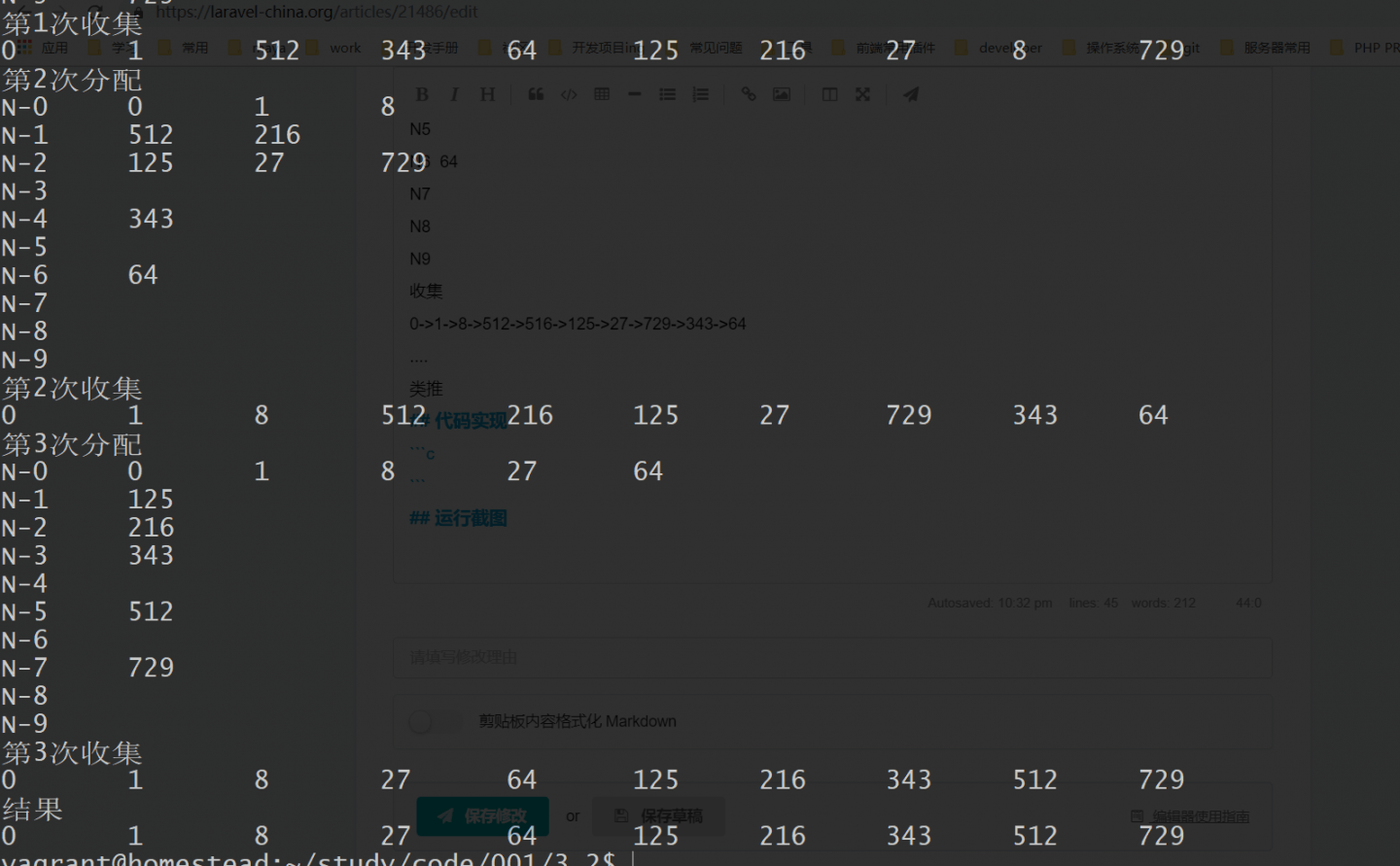基数排序-单链表实现 [数据结构与算法分析(c 语言描述)]
实现思路
基数排序本身是一个:分配-收集 过程
- 将一组需要排序的数,用链表存储 记为 L
- 用一组链表的来存放分配的节点 N[0-9]
- 遍历 L 每个节点分配到对应的 N[0-9]
- 将 N[0-9] 重新收集到 L
- 反复重复 3-4 直到最高位结束, 排序结束 ,
- L 就变成了有序
排序过程
待排序数
64 8 216 512 27 729 0 1 343 125
第一次分配
N0 0
N1 1
N2 512
N3 343
N4 64
N5 125
N6 216
N7 27
N8 8
N9 729
收集
0->1->512->343->64->125->216->27->8->729
第二次分配
N0 0->1->8
N1 512->216
N2 125->27->729
N3
N4 343
N5
N6 64
N7
N8
N9
收集
0->1->8->512->516->125->27->729->343->64
....
类推
代码实现
/**
* 基数排序-单链表实现
*/
#include <stdio.h>
#include <stdlib.h>
#include <time.h>
#define Error(Str) FatalError(Str)
#define FatalError(Str) fprintf(stderr,"%s\n",Str),exit(1)
#define N 10 //数个数
#define RADIX 10 //基数
#define POS_LEN 3 //位长
typedef struct Node
{
int data;
struct Node *next;
} *pNode;
typedef pNode LNode;
pNode create();
int get_num_pos(int num, int pos, int radix);
void radix_sort(pNode collect, int radix, int pos_len);
void append_node(pNode L, int num);
void insert(pNode P, int num);
void delete_list(pNode L);
void test();
void print(pNode L);
int main(void)
{
test();
return 0;
}
void radix_sort(pNode collect, int radix, int pos_len)
{
// collect assign
LNode assign[radix - 1], P, tmp, p;
int i, num;
for (i = 0; i < radix; i++) {
assign[i] = create();
}
for (i = 1; i <= pos_len; i++) {
P = collect;
while (NULL != P->next) {
p = P->next;
P->next = p->next;
p->next = NULL;
int num = get_num_pos(p->data, i, radix);
tmp = assign[num];
while (NULL != tmp->next) {
tmp = tmp->next;
}
tmp->next = p;
}
printf("第%d次分配\n", i);
for (int j = 0; j < radix; j++) {
printf("N-%d\t", j);
print(assign[j]);
}
//assign
P = collect;
for (int j = 0; j < radix; j++) {
LNode phead;
phead = assign[j];
while (NULL != phead->next) {
p = phead->next;
phead->next = p->next;
p->next = NULL;
P->next = p;
P = P->next;
}
}
printf("第%d次收集\n", i);
print(collect);
// 置空
// for (int j = 0; j < radix; j++) {
// delete_list(assign[j]);
// }
}
// free space
for (i = 0; i < radix; i++) {
delete_list(assign[i]);
}
}
int get_num_pos(int num, int pos, int radix)
{
int temp = 1, i;
for (i = 0; i < pos - 1; i++)
temp *= radix;
return (num / temp) % radix;
}
void insert(pNode P, int num)
{
pNode temp;
temp = (pNode)malloc(sizeof(struct Node));
if (NULL == temp)
FatalError("out of space");
temp->data = num;
temp->next = NULL;
P->next = temp;
}
void append_node(pNode L, int num)
{
pNode temp, P;
P = L;
temp = (pNode)malloc(sizeof(struct Node));
if (NULL == temp)
FatalError("out of space");
temp->next = NULL;
while (NULL != P->next) {
P = P->next;
}
P->next = temp;
}
pNode create()
{
pNode L;
L = (pNode)malloc(sizeof(struct Node));
if (NULL == L)
FatalError("out of space");
L->next = NULL;
return L;
}
void delete_list(pNode L)
{
pNode P, temp;
P = L->next;
L->next = NULL;
while (NULL != P) {
temp = P->next;
free(P);
P = temp;
}
}
void print(pNode L)
{
pNode P;
P = L->next;
while (NULL != P)
{
printf("%d\t", P->data);
P = P->next;
}
printf("\n");
}
void test()
{
pNode source, tmp, P;
int arr[N] = {64, 8, 216, 512, 27, 729, 0, 1, 343, 125};
int i;
int max = 1;
for (i = 0; i <= POS_LEN - 1; i++)
max *= RADIX;
source = create();
P = source;
srand((unsigned)time(NULL));
for (i = 0; i < N; i++) {
insert(P, arr[i]);
P = P->next;
}
print(source);
radix_sort(source, RADIX, POS_LEN);
printf("结果\n");
print(source);
}运行截图

本作品采用《CC 协议》,转载必须注明作者和本文链接





 关于 LearnKu
关于 LearnKu



